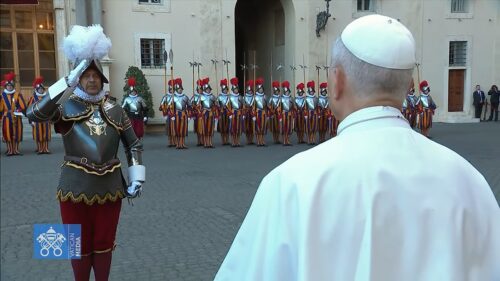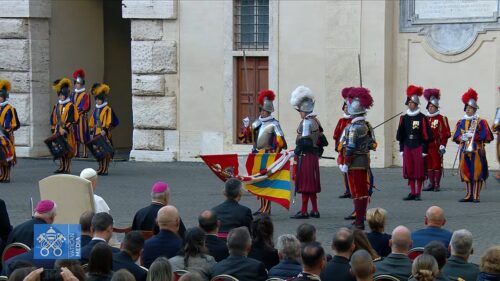ROME – When Pope Francis said repeatedly that he wanted a missionary church, calling faithful to be “missionary disciples” of the modern world, he could not have known that his successor would be a longtime missionary in his native Latin America.
With the election of Robert Prevost as Pope Leo XIV, the church got a leader who spent over two decades as a missionary and pastor in northern Peru, “going out” and “getting his hands dirty,” as Francis would say; “taking on the smell of the sheep” in the poorest communities of Chulucanas, Trujillo, and later, Chiclayo.

As someone who in his sit-down interview with me for my new biography of him said the missionary aspect of his ministry is something he deeply missed when he came to Rome, the pope is now bringing that same missionary spirit to his new role in the Vatican.
According to our own interview but also from what other friends and collaborators have told me along the way, for Pope Leo, to be a missionary is fundamentally about going out and getting to know the people in the community, so as to really accompany them in all circumstances of their lives.
To be a missionary implies not only passively trying to meet people’s most basic needs, but taking an interest in individuals and the community, being proactive in understanding their context and the needs they have, and trying to find creative ways to satisfy them.
For Robert Prevost, as for so many other foreign missionaries, this meant becoming a member of the local community he was serving, sharing with them not only the sacraments and local devotions, but standing by them in the most important moments of their lives, the crises they endured, and sharing daily life together as a community.
As an Augustinian, for whom community is key, and as a missionary ever attentive to the people around him, Pope Leo has brought this spirit with him to his new role in the Vatican – a role that is fulltime pastor, but also administrator, governor and world leader.
One example recent was the official Oct. 4 swearing-in ceremony of the 27 new recruits for the Pontifical Swiss Guard, which takes place annually on May 6, but was postponed this year due to Pope Francis’s death and the conclave that elected Pope Leo.
On Saturday, Leo became the first pope to attend a swearing-in ceremony for new Swiss Guards in nearly 60 years, with the last pontiff to do so being Pope Paul VI in 1968.
He met with the new recruits and their families on Friday, offering them a special reflection during an evening Vespers service, telling them, “The challenges your generation faces are numerous. They include environmental issues, economic change, social tensions, the digital revolution, artificial intelligence, and other complex realities that require discernment and a sense of responsibility.”
“Your stay in Rome will help you develop your maturity in these aspects of social life as well,” he said, and urged them to remain faithful to the Gospel, and to be “missionaries of hope” for all they meet during the ongoing Jubilee year.
Leo XIV then had a front-row seat as the new guards swore during Saturday evening’s ceremony to protect and defend him, even with their lives.
The official swearing-in ceremony takes place May 6, on the anniversary of the 1527 Sack of Rome, during which the mutinous soldiers of Emperor Charles V overran the Eternal City. During the attack, 147 Swiss Guards died defending Pope Clement VII, with the remaining guards finally bringing the pontiff to safety through a passage leading to Castel Sant’Angelo.
The Pontifical Swiss Guard was formed in 1506, at a time when Swiss mercenary units were common throughout Europe. When Switzerland banned its citizens from serving in foreign militaries 1874, the only exception was those choosing to serve in the Pontifical Swiss Guard.
Each year on May 6 new guards swear an oath to “faithfully, loyally and honorably serve the Supreme Pontiff and his legitimate successors and I dedicate myself to them with all my strength.”
As the oath goes, the guards also swear to uphold the same commitment “with regard to the Sacred College of Cardinals whenever the Apostolic See is vacant” and promise “respect, fidelity and obedience” to their commanders.

At the end of this year’s ceremony, postponed to Oct. 4 due to Pope Francis’s passing and the conclave, Leo said the oath the new guards took was “a very important testimony” of sacrifice and discipline in the modern world.
He said the oath was an example of “living our faith in a way that truly speaks to all young people about the value of giving one’s life, of serving, and of caring for others,” and thanked the new guards for their service.
Pope Leo then drew on his missionary roots Sunday during a Mass for the Jubilee of Missions and Migrants, saying “a new missionary age” is opening up in the church in which it is no longer necessary to travel abroad to become a missionary, because poverty and suffering are found everywhere, and he urged faithful to become missionaries at home.
Leo’s invitation is something that he is clearly already trying to live at home – through small gestures such as attending Saturday’s swearing-in ceremony, sharing in an important moment in the lives of the young men who have dedicated their lives to his service, and jumping into a full calendar of events during a busy jubilee year.
He has met countless groups and individuals, and there are now thousands of images of a beaming pope blessing babies, giving high-fives from the popemobile, stopping to grab a pizza from fellow Chicago-natives in the crowd, and catching towels, rosaries and plush toys thrown at him during his tours around St. Peter’s Square.
He has brought new energy and enthusiasm to the papacy after 20 years of popes who were older, and who faced more limiting health challenges from the beginning, and the world is responding to this new vibrancy that Leo’s election has ushered in.
Since his election, Leo has been going forward at full pace almost non-stop, even meeting world leaders, such as Ukrainian President Volodymyr Zelenskyy during his summer vacation.
The so-called “honeymoon phase” of Leo’s papacy is bound to come to an end at some point, as he begins governing and making serious personnel and reform decisions, but he seems intent to do this while also maintaining the personal touch that has always characterized his ministry.
Pope Leo is someone who, in big matters and in small, is a missionary at heart, beginning inside his own territory, with the new community around him.
Follow Elise Ann Allen on X: @eliseannallen















